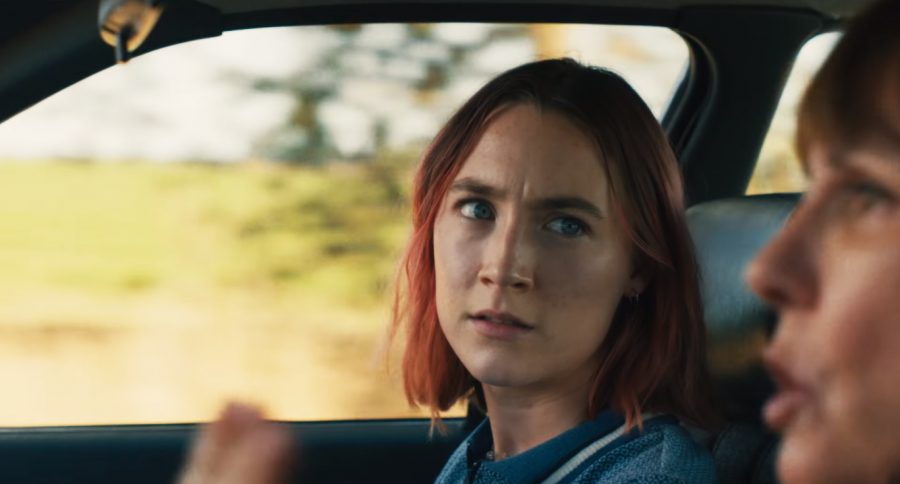‘Lady Bird’: A Tribute to Teenage Tribulations
“I want to live through something,” said Christine “Lady Bird” McPherson—portrayed by Saoirse Ronan—during the conversation with her mother where she throws herself out of a moving car.
“Lady Bird,” directed by Greta Gerwig, was released in November of 2017. The critically acclaimed film drew praise from the Hollywood elite, earning nominations for three Golden Globes this award season, and also broke a record on Rotten Tomatoes with 99 percent of Approved Tomatometer Critics giving the movie a positive review, taking down “Toy Story 2” for the highest rating.
Going into the theater, I expected a nice coming-of-age film. I heard the reviews were good, but I assumed it was another overdone, cheesy teenage movie. This belief may have never developed if I had watched the trailer, but I am a firm believer in the fact that trailers give too much away, so I abstained. I went simply as a way to spend time with friends rather than to watch a critically acclaimed film. But instead, I was in tears at the end of the movie, with one friend uncomfortably looking at me not knowing what to do, and the other capturing my emotional experience with his phone.
While I was watching the movie, I couldn’t help but notice the similarities between myself and Lady Bird. I come from the Midwest, she comes from “the Midwest of California;” I’m 17, she’s 17; I’m trying to get into colleges that are too good for me, she’s trying to get into colleges too good for her; I’m clueless, she’s clueless. In some scenes, I even felt like I was seeing parts of my life again, both the good and bad. There’s a reason Ronan won Best Actress at the Golden Globes: she draws you in with a dynamic character that you can’t help but relate to. Regardless of your gender or age, there is something in the movie for anyone to relate to. Even the two guys I watched the movie with could relate to some of her experiences and relationships.
But what makes “Lady Bird” so emotionally moving for anyone watching is the realism: it draws you in so you feel like Lady Bird. Chances are, if you have ever been in high school, you have felt like her. If you ever wished your family was richer; or wished that you were more popular or wished that you had the perfect significant other, you’ve felt like her. During the movie, there were some scenes I couldn’t relate to at all, but I empathize just the same; all the pain, all the love and all the happiness that I’ve experienced in my few years in high school was felt by her. I saw her feel it. The whole movie was like a nearby memory that validates teenage tribulations.
The one way this movie is limited is the nostalgia. Now this isn’t a problem for people who lived their teenage days before 2004, but it is for people like me who don’t truly understand the value of Justin Timberlake’s hit Cry Me a River, or what it’s like to live without a cell phone, or understand living through the Iraq War (my generation might have to settle for World War III, but that’s neither here nor there). I will never get the same nostalgic feeling that the adults in the theater felt no matter how many times I watch it or how many tears I shed. At the end of the movie, I was talking about things that were still my realities—like the crippling nature of the college application process. During my panic I heard those who were older reminisce about the days without cell phones. But this hardly qualifies as a critique. It is simply acknowledging that the takeaway will be different for a girl like me trying her best to get through high school and a woman very well past high school trying her best to get through the real world.
Too many times have I been told, “Oh that’s not a real problem; you’re only in high school.” But problems I have faced are real, and they’re highlighted in “Lady Bird.” These tribulations are what cause Lady Bird to “live through something.” Teenage years should not be underrated like they so often are. We may be selfish and stupid and ultimately clueless, but that’s what makes these years so turbulent and pivotal. We have to navigate relationships we think we understand, but clearly don’t, and chase after things we think we want, but really don’t. This movie supports the notion that the problems you experience when your age ends with “teen” are just as valid and important as the ones you experience when your child’s age ends in “teen.” But who am I to say? I’m only 17.
Your donation will support the student journalists of Troy High School - MI. Your contribution will allow us to print our work, purchase equipment and cover our annual website hosting costs.

